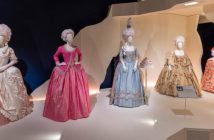It was a gloomy afternoon in late February when Sabu had finally fastened the straps on my portmanteau. I had a flight to catch that night back to India. I had been invited to dine by the editor of the Bombay Gazette in the Harbour Bar of the venerable Taj Mahal Palace Hotel in downtown Bombay (or ‘Mumbai’ as the unwashed insist on calling it). Last time this happened we polished off two bottles of Chateau Lafite Rothschild Pauillac 1996 and half a bottle of thirty year old Talisker. One didn’t decline the invitation to dine with the editor of one of India’s finest rags, or rather, with the editor with the keenest reputation as a bon vivant, even if that did mean crossing two continents to make the appointment.
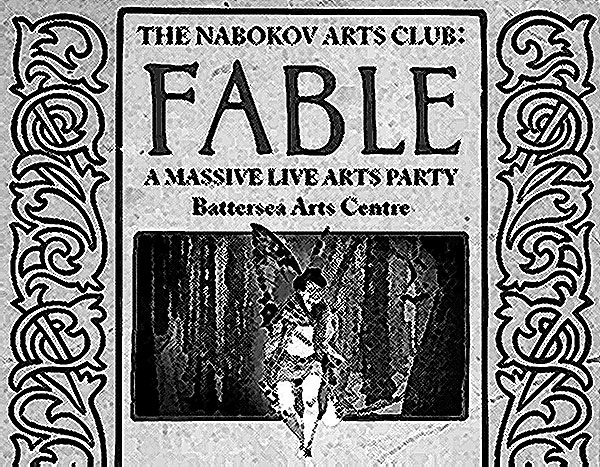
I was just easing off my velvet slippers with the curly toes and reaching for my boots when there was a rap at the door. Sabu returned with a solemn face bearing a despatch – a telegram, no less. How Jonesy knows how to sugar the pill, to feather the lure, if you’ll allow me to mix my metaphors. It read:
The nabokov Arts Club presents Fable Stop This Friday night Stop Thought this might interest you Stop Ed
Damn Jonesy and his wily ways! Asking a Hindu if he might like to attend an evening of music and stories featuring animals which express some pithy maxim is like asking an alcoholic if he might not like another drop of the red stuff, or asking the Pope if he wouldn’t mind telling that old one about Thomas Aquinas again. It’s in our blood, by Krishna!
With a heavy heart I got Sabu to cancel the flights and I set about writing the editor of the Bombay Gazette a sad missive explaining that my gout had flared and that travel for the time being would, simply, be impossible. Jonesy had won, but at what cost? This ‘Fable’ had better be good.
It was a muggy, misty night when I set out to experience the cause of my self-sacrifice. The cabs which normally patrolled Highbury New Park had all curiously vanished and we were forced to brave the vagaries and indignities of Friday night on the Victoria Line. This was made all the more challenging by our apparel. I had seen no indication of dress code on the invitation, so I had saught to clarify things with a call through to the box office. Surely there must be some nod to the theme, some attempt to corral and inspire the lazy with the animal spirit.
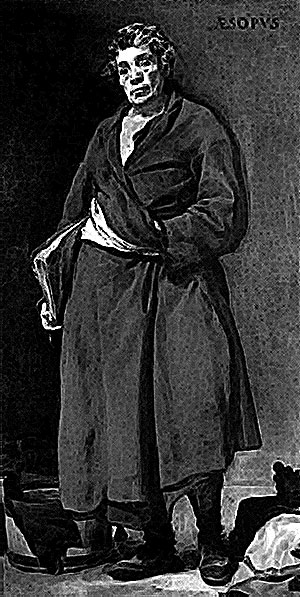 “Is it fancy dress?” I inquired, I thought reasonably enough.
“Is it fancy dress?” I inquired, I thought reasonably enough.
“Fancy dress?!” echoed the posh but slightly demented female voice at the other end, before dissolving into a noise which was half cackle, half expiring wheeze, “Well, no. Yes. If you like!”
The image fronting the invitation was no more helpful and slightly less encouraging, depicting, as it did, a rather plain girl with black framed spectacles, white bowed legs protruding from a denim mini-skirt, with purple butterfly wings sprouting from her shoulders carrying a Tesco’s shopping bag. Behind was an ink-washed interpretation of a fairy tale forest.
But then I remembered the words of my Great Uncle Bo-pal of Bangalore, “Remember Rahnam, you can never be over dressed. Clothe yourself like a prince and the world will believe you one!” Admittedly he was normally followed by a retinue of street urchins who would attempt to dislodge his magnificent snow white pagri with lumps of animal dung but the sentiment was there nevertheless.
Emboldened thus I selected my outfit for the occasion: cream churidars, white and burgundy harlequin brogues and a black homburg, to mix things up, and topping it all off, the pièce de résistance – a dark blue calf length sherwani with stiff Nehru collar embroidered with animals of the zodiac (intended as a witty reprise of the fable theme). Coming up the rear in a simple tan kurta crept the indefatigable Sabu.
We met with no adversity on public transport, most people being either too prematurely drunk or too shell-shocked from a week stuffed behind keyboards to notice my kingly apparel. At about nine pm, an hour after leaving home, we reached the colonnaded steps of the Battersea Arts Centre and passed through the strange bleary plastic windbreak into the foyer beyond. Through the panelled glass swing doors ahead I spied activity and sniffed mischief. I turned to Sabu. His face bore a plaintive, constipated air. Poor fellow, it wasn’t really his cup of tea (come to think of it, nothing social or cultural or, Heaven forbid, a combination of the two, really was) so I despatched him to Gad’s Hill where he had taken a fancy to the local curry house owner’s daughter.
“The undisputed heavyweight champion of artistic happenings anywhere, ever, is back!” modestly proclaimed a press cutting of the nabokov Arts Club (small ‘n’) that had been sent to me. Well, we would soon see. I stepped up to the box office which was situated behind a broad wooden counter and was served by the same woman from the phone who was less posh and more demented in the flesh.
“I recognised your name!” she giggled manically, handing me my ticket and stamping my wrist (a vulgar affectation of exclusivity I find an affront at such things).
“And can I have a programme?” I inquired.
“Programme?!” she trilled in astonishment as if I had asked her to strip naked and tap dance to the tune of ‘Bunny Lake is Missing’.
“Programme?!” chimed a ginger-headed man with glasses and a small mouth who had wafted in behind her, “We don’t have ‘programmes’”, he added witheringly as if the mere idea was passé and revolting.
“Well could I have something,” I returned, “I’m covering your little shindig and I need to know who’s who and what’s where. I’m press,” I declaimed imperiously, fixing him with a steady gaze so that he would know I could elevate or destroy him with a single swish of my pen.
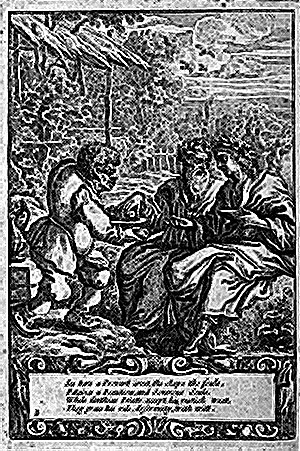 Muttering, he disappeared into a back room before returning five minutes later with a single sheet of smudged brown paper on which was printed a layout of the building and a rudimentary timetable. All the while the demented girl watched me with a lopsided smile and eyes that flicked ceaselessly round the room. Strange sounds emanated from her throat. She turned away when another guest sidled up to the counter. He had a ring through his nose of the size and sort normally reserved for tethering bulls. Below this he wore a large floppy velvet bow tie and frilled shirt front. He seemed to be sweating.
Muttering, he disappeared into a back room before returning five minutes later with a single sheet of smudged brown paper on which was printed a layout of the building and a rudimentary timetable. All the while the demented girl watched me with a lopsided smile and eyes that flicked ceaselessly round the room. Strange sounds emanated from her throat. She turned away when another guest sidled up to the counter. He had a ring through his nose of the size and sort normally reserved for tethering bulls. Below this he wore a large floppy velvet bow tie and frilled shirt front. He seemed to be sweating.
“And where is the cloakroom?” I asked, shrugging off my astrakhan cape.
“Cloakroom?!” started the girl.
“Cloakroom?!” echoed the man.
I was already backing away when he called after me indignantly, “We don’t have a cloakroom!”
I had reached the swing doors and was ushered through – graciously this time – by another servant of the house, when I overheard a new couple arriving at the box office ask, “Do you have a programme?” The doors swung to behind me, silencing the response. I was in.
Ahead a large group milled about at the foot of the grand marble staircase which scalloped to the left and right up to the first floor. Most were in depressingly ordinary garb.
“What time are you on?”
“I’m sorry?” I said, turning round. I was confronted by a girl who looked like a mouse but was the size of a dog.
“You are one of the acts aren’t you?”
I smiled sweetly just as a twin apparition in gold body paint and a ragged chemise loomed towards me out of a doorway. Their heads were conjoined by a rubber duct which resembled a cross between a tape worm and an eviscerated accordion. I could not discern what manner of living form they represented.
“Here’s the man with the hat, the man with the clothes!” they chanted as they groped forwards, eyes shining, tongues flickering. I gave them the slip and darted down a passageway. They floundered in my wake, keening like thwarted sirens. I was heading for the gentlemen’s. I needed to re-group and re-think. My costume was evidently garnering the wrong sort of attention, the sort that might make my role of chronicler, of latter day Pepys, a trifle irksome. I found the vestibule outside the lavatories thronged with people. “Shiva’s teeth!” I thought to myself, imagining it to be a queue, “No peace even in this normally tranquil harbour.” I turned to a dark haired woman at the front who had a mouth like a poorly aimed slice in a melon,
“Is this the queue for the –“
“- lift with green trolls? Yes it is!” she piped excitedly.
“Of course it is,” I chanted weakly.
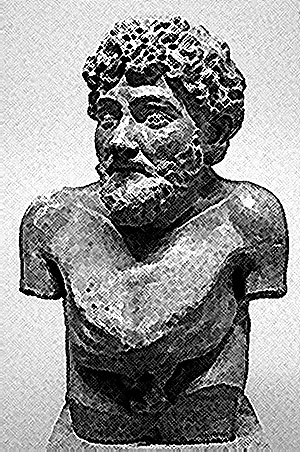 I somehow found my way to the gentlemen’s and slooshed my face in the wash basin. “Come on Rahnam!” I told my wilting reflection, “This is no time for second thoughts and shrinking violet-ness. Gather yourself. Walk tall. After all, you are a professional. And a Pachry.”
I somehow found my way to the gentlemen’s and slooshed my face in the wash basin. “Come on Rahnam!” I told my wilting reflection, “This is no time for second thoughts and shrinking violet-ness. Gather yourself. Walk tall. After all, you are a professional. And a Pachry.”
A few minutes later I had joined the queue to see the trolls who indeed seemed to be housed in the adjacent lift from which various noises sprang. The doors clunked open and a guest – nay, victim? – reeled out with a dazed smile. He was followed by a trouser-less man in a buttoned lab coat carrying a pointer and wearing thick black framed spectacles.
“And ree – member!” he called after him in a heavy German accent, “you are svorn to see-crecy!” He wheeled round, pointer aloft. “Vun by vun. You know ze rules. Who zis next?” The woman with the mouth was guided in. The doors clanged shut behind her. The strange noises resumed. “Apparently every third person vanishes. Or is it every fourth?” said a man in a red scarf tremulously.
Eventually it was my turn. The lift doors opened cavernously like a hungry mouth. The interior was cloaked in the swags of a camouflage net. The German professor took my arm.
“Vot zis your name? Vot do you do? And vere are you from? Oh, and duck!” he added as he eased me under a hanging flap. I removed my hat and murmured the requested information. When I came up I was standing in a hot cramped space hung with the same material. Suddenly it began to twitch and move. Two figures were rearing out of the very walls, twisting round to face me. Their faces were obscured by great shaggy fringes of string. One clutched a ukulele, the other a saxophone. The trolls!
Without warning they launched into a song about an Indian writer from Highbury. It dipped and rose and just when you thought they were going to fall flat on their faces, they recovered with a witty reprise. It was all very amusing and entirely improvised. One thing was troubling me though.
“Who’s Randy?” I inquired of my Teutonic host.
“Zat is you, no?”
Disabused of this rather leaky blip, the singing troll managed to work his mistake into the ditty, concluding in rhyme that ‘Randy’ was my nom de plume. The song ended and with smiles and nods of thanks to the two troubadours, I was ejected back into the vestibule. After a faultering start the evening was beginning to come good. What was needed now was a fortifying drink and a glance at the programme to see what was in store.
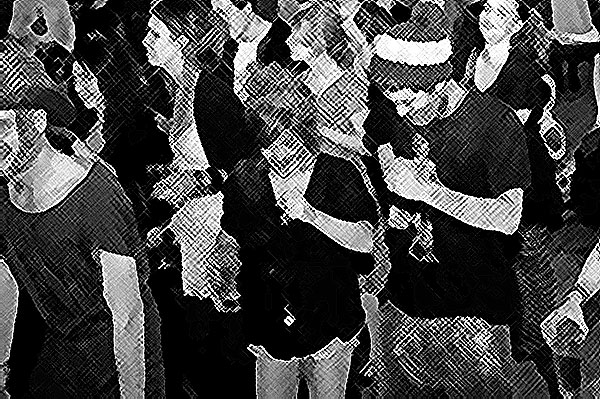
In my probings of the nabokov Arts Club, they had remained as determinedly opaque and mysterious as the scribblings of Vladimir himself. I did discover though that they had hosted four years of packed warehouse parties at Village Underground in Shoreditch and that the previous October they had put on a Hallowe’en weekend spectacular entitled “Festival of the Dead” also at the Battersea Arts Centre. Whilst there is no doubting the vigour and protean abilities of these young turks, I sense their emergence is part of a wider sea change in the cultural life of the capital. No longer are discerning flaneurs and voluptuaries content to have their toast buttered merely on one side. In an environment of huge sensory variety this is increasingly being demanded under one roof. Hence the appearance of such artistic medleys as ‘The Cats’ Meet Show’ (which I reviewed last year) and the growing popularity of ‘promenade’ and ‘site specific’ theatre. This last has probably best been realised by the Punch Drunk Theatre Company with their startlingly original productions of Faust and Masque of the Red Death using the immersive technique where the audience watch and follow the action happening amongst them in a non-conventional space.
For others an impatience to get to the party means starting this early – in the theatre. Which is as well for the nabokov, for this is precisely what they offer, amongst other dishes; “An extravaganza of live theatre, music, comedy, dance and visual art wrapped up in a big fat party.” The proscenium arch, if not having crumbled, is certainly trembling at this moment.
Alas, for me, the bar (or ‘Die Konditorei’ as it was perplexingly known on the night) was hedged in by a wall of folk thirstier than I so I retreated once more into the tessalated foyer. The crowd at the foot of the staircase had swelled. I edged closer. Everyone was standing in silent tableaux, facing the broad half landing with the balustrade above. Several feline forms, who in my slightly feverish imagination seemed to be coloured blue, were swaying and contorting themselves rhythmically. They were part of the promenade dance troupe ‘dANTE OR dIE’ (sic.) who, evidently with the caps lock on, would perform at intervals in different parts of the building, emerging unexpectedly like cobras from a snake charmer’s basket. As their feet glided over the floor I noticed that the steps were thick with tiny white feathers which jumped and swirled like heavy mist.
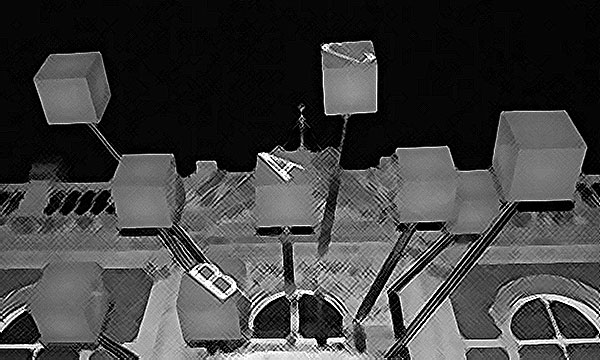
The routine came to a close and I was carried upwards with the dispersing crowd. I consulted the programme which was in small spidery print and which required the donning of my pince nez to decipher. There was a bewildering amount to choose from in half a dozen rooms with everything running simultaneously. Fortunately, most acts were on twice so it was possible, for instance, to step from the first showing of Fitzgerald in the ‘March Hare Theatre’ (as I did) to the second showing of Gavin Osborn in ‘The Clearing’ (as I also did). It was rapidly approaching nine thirty so appropriately I opted for ‘Fairytales’ by Jack Thorne in the ‘Lunar Hall’.
I made my way through the ‘Hop Den’ which included another bar and was decked out like a tart’s boudoir replete with rumpled chaise longues and hanging flaps of chiffon. I entered the grandly titled but decaying Lunar Hall from the west. This was by far the largest space in the building with a sprung parquet dance floor and a heavy lighting rig revealing scratched half panelling and blown plaster work. At the opposite end a stage was set. There were no seats but in the middle had been plonked a curious platform on which the weak of leg had collapsed. Here I spied my friend with the nose ring and bow tie, typing away earnestly on his phone as if penning an opus. Knots of people drifted about with a sort of wan commitment.
The chatter lessened slightly and I noticed that a slight young man holding a guitar had mounted the stage, accompanied by a slightly larger girl of the same age. I presumed this had to be Jack Thorne, the fashionable new writer of television shows This is England and The Fades. The pair looked at each other and then at the audience. The audience looked at them and then at each other. So began a ditty which was half spoken and half sung, half dialogue and half monologue, half funny…and half not. It detailed their relationship (real or imaginary) and subsequent marriage which evidently was not a bed of roses. It amounted to a sort of inversion of the Cinderella story – the handsome prince becomes a frog when kissed, if you’ll allow me to mix my fairytale metaphors. Although performed with gusto it smacked a little of student review and there were a few moments early on when it teetered perilously close to failure – the atmosphere in the room had gone flat, the audience looked on in mild confusion and the face of the girl looked near to panic. It was rescued by a line that was a trifle profane but which provoked some voluble laughs. Suddenly it occurred to the audience that what they were watching was musical comedy, permission to laugh was granted, and the duo sailed through to the end with an appreciative applause.
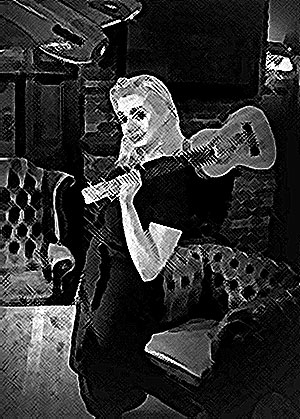 At fifteen minutes ‘Fairytales’ was a short set, so I decided to stay on in the same space to investigate the next act who was on for an equal length. Rachel Darcy was billed as a “ukulele superstar”. Whether this was exaggeration on the part of the programmers remained to be seen but what was certain was that retro girls strumming tiny guitars has become something of a ‘thing’ in recent months (the charming trio of The Strumpettes is one example that comes to mind). Miss Darcy, petite and curvaceous, took to the stage wearing a blue mini-skirt, pixie boots and a furry wolf head mask (or perhaps it really was her head – one doesn’t like to presume in these days of political correctness and Twilight takeover). Wielding the ukulele like an extra arm she dived straight into her first song. Unfortunately her muffled voice seemed to be issuing from a locked closet at the back of the stage (I safely concluded that, yes, she was wearing a mask). This rather stultifying effect continued for another couple of songs until, tiring of the heat and effort of singing through a narrow hairy aperture, she ripped the mask off with a flourish, revealing a winning smile and dazzling set of pearly whites. The effect on her singing was immediate and dramatic, as it was on the audience who edged closer and grew larger. She had a clear and lovely voice and her songs had a nice combination of the personal and the toe tapping. By the final one she had the audience eating out of her hands, to coin a phrase, and the set ended with an eruption of applause.
At fifteen minutes ‘Fairytales’ was a short set, so I decided to stay on in the same space to investigate the next act who was on for an equal length. Rachel Darcy was billed as a “ukulele superstar”. Whether this was exaggeration on the part of the programmers remained to be seen but what was certain was that retro girls strumming tiny guitars has become something of a ‘thing’ in recent months (the charming trio of The Strumpettes is one example that comes to mind). Miss Darcy, petite and curvaceous, took to the stage wearing a blue mini-skirt, pixie boots and a furry wolf head mask (or perhaps it really was her head – one doesn’t like to presume in these days of political correctness and Twilight takeover). Wielding the ukulele like an extra arm she dived straight into her first song. Unfortunately her muffled voice seemed to be issuing from a locked closet at the back of the stage (I safely concluded that, yes, she was wearing a mask). This rather stultifying effect continued for another couple of songs until, tiring of the heat and effort of singing through a narrow hairy aperture, she ripped the mask off with a flourish, revealing a winning smile and dazzling set of pearly whites. The effect on her singing was immediate and dramatic, as it was on the audience who edged closer and grew larger. She had a clear and lovely voice and her songs had a nice combination of the personal and the toe tapping. By the final one she had the audience eating out of her hands, to coin a phrase, and the set ended with an eruption of applause.
Fancying a change of pace, and space, I made my way through to the ‘March Hare Theatre’ at the back of the building to experience what was listed as ‘The Flying Dutchman’. Surprisingly, I found a queue (although the programme warned this could happen in the more ‘intimate’ spaces). We were soon seated, though – in the only room that had them – a rectangular auditorium with the sunken stage on one long side. A table was set up here, with a chair behind it. On the former rested a large, flattish box-like object which looked like a cross between an Orthodox bishop’s Bible and an artist’s portfolio. Wandering hither and thither was an impossibly tall and lanky individual who I mistook for a technician until he sat down at the table, revealing himself to be the titular Dutchman. He gazed silently at the audience for a few moments with the playful, intelligent eyes of a practiced storyteller, before heaving the box-like object in two, revealing it to be…a giant pop-up book! So began the story of the boy who went on the run from home, passed through various worlds and who had numerous adventures. This was all related by a combination of live speech, turning of the mighty ‘book’ pages (each of which revealed a fabulously conceived scene in paper sculpture), ramshackle puppetry and audience participation. There was something wonderfully childlike both in the glee with which the performer set about his tricks, and in the way the audience delighted in them. It felt like being on a Blue Peter set for adults (and, in fact, his curly hair and goofy grin reminded me of Geoffrey from Rainbow, to further complicate the children’s television references of mine). To top it all, the Flying Dutchman really was Dutch and his Sesame Street vowels added a further surrealistic frisson to proceedings.
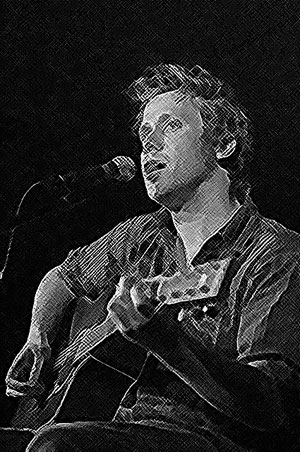 Eventually the story came to an end, the Dutchman took a bow and was cheered off appreciatively by the audience. I had decided to stay for the next act, as much for convenience as out of curiosity, but we were all compelled to leave and re-queue, which was a little bothersome. ‘Fitzgerald’ was the curious mono-name of the next performer. “Storytelling through music and spoken word” was the rather nebulous description in the programme. I felt a quickening of the pulse and a slight turn of the guts. Put simply, in my experience spoken word could be awful – amateurish, self indulgent, inexplicable. That it could also be rather good explained why I was sitting there. Still, I had my qualms.
Eventually the story came to an end, the Dutchman took a bow and was cheered off appreciatively by the audience. I had decided to stay for the next act, as much for convenience as out of curiosity, but we were all compelled to leave and re-queue, which was a little bothersome. ‘Fitzgerald’ was the curious mono-name of the next performer. “Storytelling through music and spoken word” was the rather nebulous description in the programme. I felt a quickening of the pulse and a slight turn of the guts. Put simply, in my experience spoken word could be awful – amateurish, self indulgent, inexplicable. That it could also be rather good explained why I was sitting there. Still, I had my qualms.
Fitzgerald, in fact, turned out to be three – two boys and a girl. I use the terms with good reason – their combined ages probably still fell short of my single one (the stoop-shouldered front man still had a halo of peach fuzz clinging to his lower jaw). They shuffled forwards tentatively – Boy One to the left with a guitar slung round his neck and a showing of real beard (at least I presumed it was real), Peach Fuzz in the middle and Girl One to the right. With an exchange of looks and the same air of uncertainty, they began, Peach Fuzz launching into a story of sorts, once more about a boy, and Boy One supplying a restrained strumming pulse on the guitar. At a certain point the baton was passed to Girl One who took the thread of the tale, folding it somewhere else before handing it back. At another point the speaking ceased and Boy one embarked on a complicated guitar solo which sounded a little like a third voice. The narrative wasn’t always easy to follow but perhaps it wasn’t meant to be. Looking back, I can’t really remember what it was about but instead have a vague sense of the musicality of the words. Fitzgerald were interesting; if they didn’t quite hit their marks they were striving, and might with practice get there.
After this I decided to remove myself to the Clearing which nestled to the right of Lunar Hall. To enter, one had to scuttle down a long tunnel made of bedsheets hastily pinned together. This opened out into a largish room scattered with cushions and hung with silk canopies with something of a ‘One Thousand and One Nights’ feel. I made my way to the far end and dropped down on an ottoman as people began to arrive and disport themselves amongst the pillows like odalisques and courtiers awaiting the pleasure of the sultan.
The sultan in question was one Gavin Osborn (although a sultan more in form than inclination – being of generous girth). He was more of a modern day Woodie Guthrie, having performed his folksy ballads with Daniel Kitson and in support of Belle and Sebastian on a recent tour. A sultan of swing if you like, or perhaps ‘folk swing’.
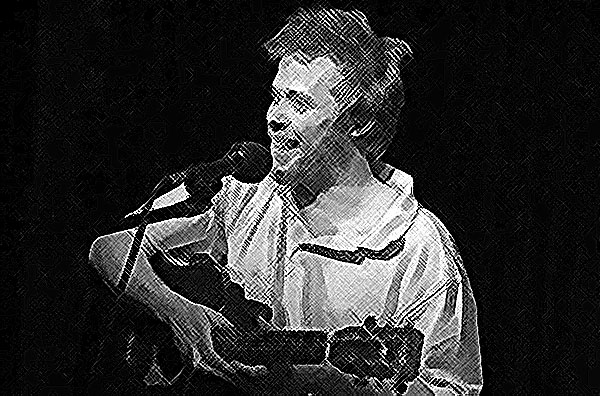
Mr Osborn, seated at the back by a keyboard with a bottle of Budweiser attached to his lips, slowly climbed to his feet when the last of the audience had floated in and ambled over to the microphone. He stood roughly in the middle of the room, like a circus ringmaster. Unfortunately for me I was seated at the rear and my view now consisted of his not inconsiderable rump. Although of an unprepossessing appearance, Osborn had an easy manner and was something of a raconteur, interacting breezily and amusingly with the audience before getting going. The starting point was “Aesop’s Fables” from which he spun a set of surprisingly witty songs sung in a conversational style and accompanied by his own playing on acoustic guitar. With all the smiling, laughing faces gathered round on the floor it had the flavour of an old Haight-Ashbury love-in. When the crowd began to break up at the end and the smiles still lingered there was a feeling we had been entertained in old fashioned style.
It was eleven thirty and I now felt thoroughly warmed up. Things chugged on apparently until two but sadly my time was almost at an end. I decided to do one more tour of the building as a valediction and to satisfy my still twitching curiosity. ‘The Marquee’ on the ground floor, hung with rouged silver drapes and glitter balls, could best be described as the dance floor. At that moment it was fairly empty apart from a badger and deer who flung themselves round manically in the centre of the room in ever decreasing circles. Next door was the ‘Cuckoo’s Nest’. It was filled with the assorted bric-a-brac of an old curiosity shop including thirty or forty ruptured feather pillows which presumably accounted for the avian thatching on the staircase.
I returned to Lunar Hall in the hope of catching the opening chords of ‘King Porter Stomp’ – a funk, ska, dub and hip-hop outfit who had apparently gone down a treat the year before as the house band for The God of Soho at Shakespeare’s Globe. A glittering-eyed anticipation ran through the crowd who blew in, in puffs, from the doorways. The band, louche and rakish in hats, beards and waistcoats, loped across the stage readying their kit. A large screen hung behind showing their latest madcap musical video. This evidently would be where the action would now concentrate.
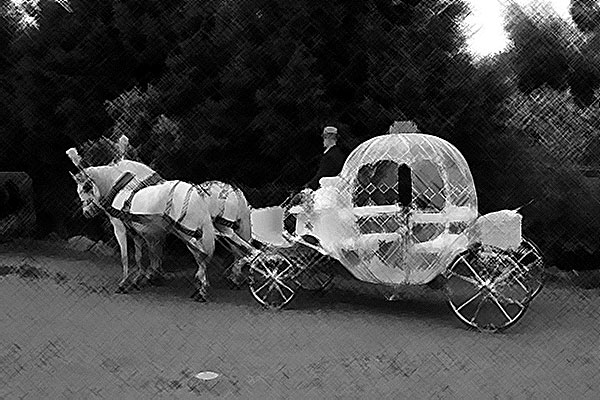
On this smorgasbord of cultural edibles where the rough and the smooth had rubbed along merrily together, I had been serenaded by trolls, entertained by a bona fide ukulele superstar, flown with a Dutchman and been edified by Aesop’s folksy disciple. Alas, I had also missed Hiraeth’s ‘Red Riding Hood’, Patrick Magee’s ‘fables-inspired comedy’, Rae Evans’s ‘Fairytale songs’. Cia Huma: Makuto ‘Cabaret juggler’, Amanda Wilkin’s ‘Blues Princess’ and a personal appointment with a fabulist. Such were the choices and sacrifices of such an evening. It now looked like I was going to miss some memorable music and the crescendo to the party. But I could see Sabu’s worried face misting up the glass in the door. It was almost midnight. I had to go before my carriage turned into a gourd and my manservant into a very tired mouse.



